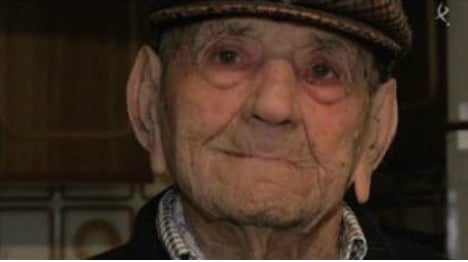Francisco Núñez Olivera died on Monday morning.
He born on December 13th 1904 in the village of Bienvenida in Badajoz, in the region of Extremadura, western Spain.
Francisco – known as Marchena – fathered four children, nine grandchildren and 15 great-grandchildren. He became the world's oldest man in August on the death of Yisrael Kristal, a holocaust survivor who lived to the age of 113 years and 330 days.
Muere a los 113 años Francisco Núñez, el hombre más longevo del mundo, en su casa de la localidad de Bienvenida (Badajoz) https://t.co/dmnN4AulEo pic.twitter.com/t41APodcIp
— Antena3Noticias (@A3Noticias) January 30, 2018
He had been a widower since 1988 and his two sons have died but he lives with his eldest daughter, María Antonia, 81, and near his other daughter Milagros, 78.
He spent his last birthday when he turned 113 with Maria Antonia where he started the day with cake for breakfast and then read birthday cards sent to him from around the world.
READ MORE: World's oldest man celebrates 113th birthday in Extremadura
“He will be missed by everyone,” said Antonio Carmona, the mayor of Bienvenida, the town where Marchena lived his whole life.
He will be buried on Tuesday and will be given an official sent off in the town where a day of mourning has been declared.
READ: Want to know the secret to long life? Live in Spain
He put his longevity down to “good genes”, “hard work” and a varied diet of homegrown vegetables. He also enjoys a daily glass of red wine.
His brother Luis, who lives in Asturias, is 95 and his sister Jacoba, who also lives in Bienvenida, is 93.
“I worked in the fields all my life,” he told El Mundo last year.
His ID says he was born on September 13th 1904 but his daughter says he is actually three months younger and was born on December 13th.
He was ten years old when the First World War broke out and in the 1920s he fought against the Berbers in Morocco during the Rif War between Spain and its North African neighbour.
His secret to such a long life, he said was “to work hard. To not be weak and stay in the house.”
His daughter added a few more reasons as to why her father may have lived such a long life, including “a gentle routine in a quiet village, being his own boss, not arguing with the family and enjoying the good life – that revolved around the field, his house and the village bar.”
He also had a varied diet despite not having had his own teeth for four decades, she explained.
His daily food consisted of milk and madeleines (a light sponge cake) for breakfast with an Actimel. Meat, fish or stew for lunch, yoghurt for an afternoon snack and special cereal with milk for dinner.
Speaking last year he said he had enjoyed good health until he needed a kidney removed when he was 90, a cataract operation aged 98 and was hospitalized for a urinary infection when he was 108. He claims to have never broken a bone and to have perfect blood pressure.
While Francisco had the records to prove his age, they are not the originals – which were burned during the Spanish Civil War.
Spaniards have one of the highest life expectancies in the world, which is often attributed to the Mediterranean diet and traditional slower pace of life.
READ MORE: Six Spanish secrets on how to live to the age of one hundred
Spain is also home to Europe's oldest woman, Ana Vela Rubio, who celebrated her 116th birthday in October.
But one Spaniard who lived to the ripe old age of 107 did so on a diet that consisted mainly of… red wine.
The world's oldest human is currently Nabi Tajima of Japan who was born on Aug. 4, 1900 and is currently 117 years old.



 Please whitelist us to continue reading.
Please whitelist us to continue reading.